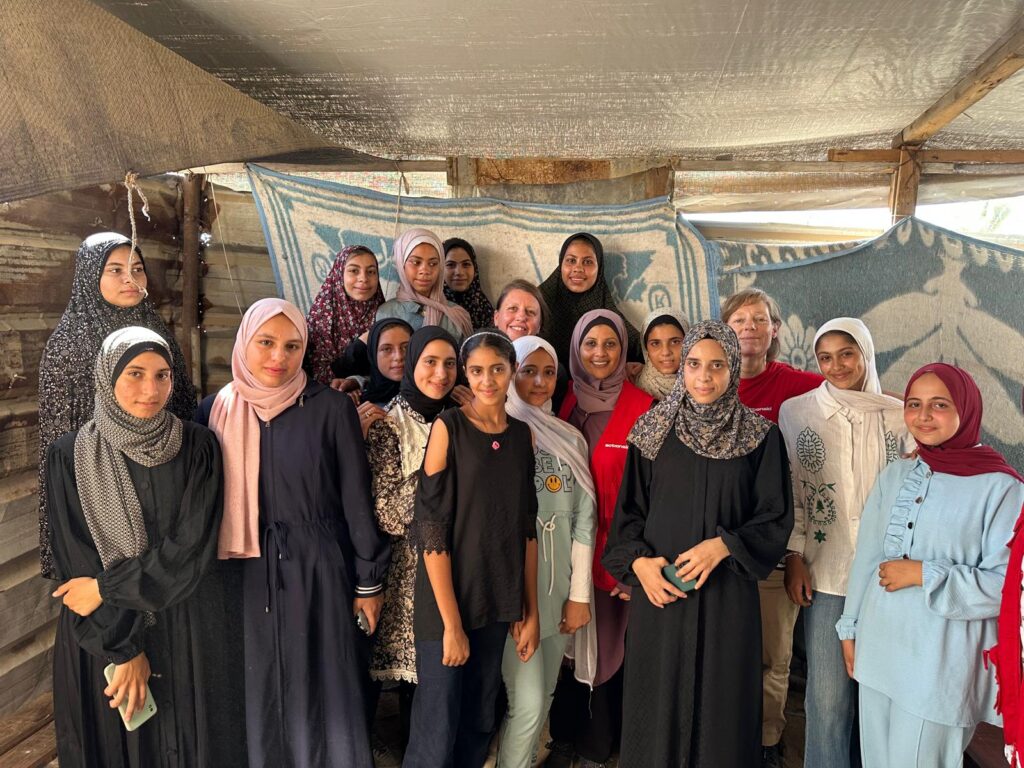Violence, forced displacement and systemic discrimination are disproportionately impacting Palestinian women and girls in Gaza and the West Bank.
A new report from ActionAid has shared the harrowing stories of women and girls who are bearing the brunt of Israel’s attack on Gaza and its continued occupation in the West Bank.
It’s been almost one year since Hamas attacked Israel on October 7 2023, killing almost 1,200 Israeli civilians and taking 250 hostages.
Since then, Israel’s assault on Gaza has killed more than 11,000 women and at least 16,456 children, according to statistics from Al Jazeera.
According to ActionAid’s report titled Agents of Change: The Role of Palestine’s Women-Led Organisations in Crisis, the war is hitting women the hardest.
Ruham Jafari, the Advocacy and Communications Coordinator at ActionAid Palestine, said women and girls’ voices and perspectives “must not be sidelined”.
“Women and girls in Palestine face unique and severe challenges as the devastating war in Gaza continues and violence in the West Bank escalates, yet amid these crises they are showing remarkable resilience and emerging as trusted leaders in their communities,” Jafair said.
“It’s time for local and international stakeholders to value the essential contribution of women by increasing funding to women-led organisations and ensuring women have a seat at the table when crucial decisions about Palestine and its future are being made.”
What are the findings?
Statistics spotlighting the impact of the conflict on women and girls in Gaza can only go so far: according to ActionAid, there is an unseen emotional and psychological toll that women and girls face, including extreme levels of stress, anxiety and trauma.
Crowded living conditions in Gaza make it harder for Palestinians to manage their emotional and psychological health, and women and girls are particularly struggling with this, ActionAid found.
Further, as a result of the war, women and girls are at greater risk of experience gender-based violence, sexual violence, forced marraige and exploitation, due to a lack of privacy and safety.
As one woman described to ActionAid as they drafted the report: “In the past, walls were our cover. Today, it’s just a piece of nylon.”
The stories women and girls shared with ActionAid are devastating. One woman from the West Bank told the organisation her neighbour was “taken inside a room” by Israeli soldiers and “all her clothes” were taken off, before they “let a dog attack her, in front of her husband and kids”.
There are very few, if any, safe spaces for women and girls providing gender-specific support, ActionAid also found.
An example of this is a complete lack of obstetric care for pregnant women, leading to tragic outcomes.
Dr Adnan Radi is a doctor at Al-Awda hospital, who has witnessed “a sharp increase in the rate of [high-risk] pregnancies, complications [relating to] premature birth, an increase in miscarriages and problems such as infections, sepsis, bleeding, and others”.
Any reproductive healthcare is hard to come by for women and girls, Dr Radi said: “Inserting an IUD is not possible due to the lack of sterilisation of the materials needed by the doctor.”
Other findings from ActionAid’s report include women taking on additional workload and responsibilities as a result of the humanitarian crisis, as well as their absence in leadership and decision-making roles.
Michelle Higelin, the Executive Director at ActionAid Australia, said peacebuilding and reconstruction efforts in Palestine rely on involving women’s voices and perspectives.
“The year-long conflict in Gaza has hit Palestinian women and girls the hardest,” Higelin said.
“Women’s reproductive rights, health and security have been rapidly eroded over the past year. It is critical that women are at the forefront of the humanitarian response in Gaza and the West Bank, as well as peacebuilding and reconstruction efforts.”


